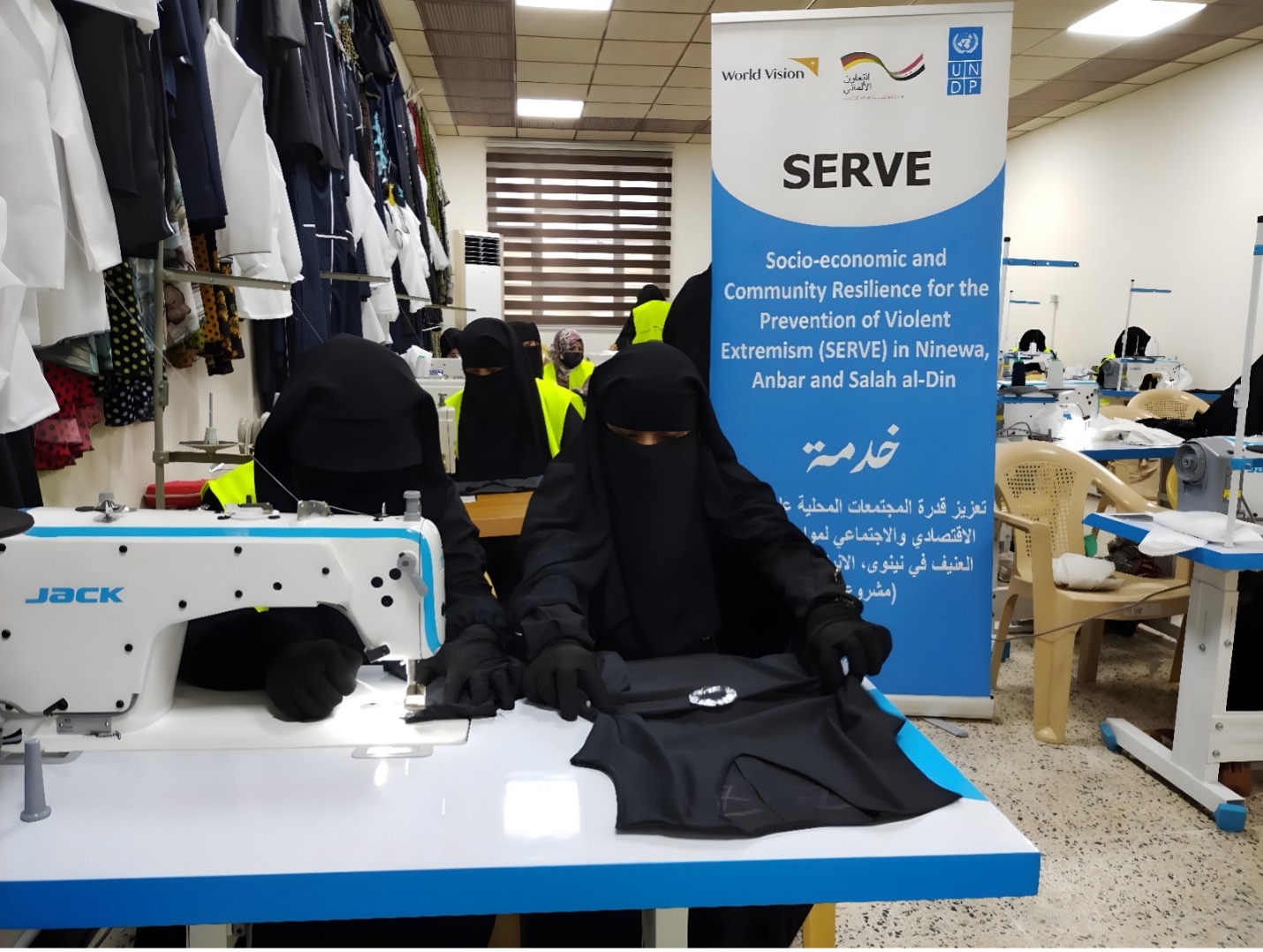Rebuilding lives one stitch at a time in Iraq
The Women’s Sewing Workshops
December 18, 2023

Women in a sewing workshop
In the heart of the Iraq cities of Al-Qaim, Rummaneh, Baiji, and Mosul - an echo of progress rings through the women’s sewing workshops.
The workshops are part of the United Nations Development Programme (UNDP) and its partner World Vision International (WVI)’s for training programme returnees and host communities recovering from years of conflict in Iraq.
They are intended to provide new skills to various women who are rebuilding their lives after several years of conflict. The women were either internally displaced during the ISIL conflict, former refugees returning from Al-Hol Camp, or vulnerable members of the community. Trainees were carefully selected through an inclusive and conflict-sensitive method.
An act of kindness – Giving back to the community
As the hum of sewing machines echoed through the centres, a heart warming story unfolded. The women of the sewing workshops agreed to use their new skills to give back to their community.

Jalilah Ahmed, one of the sewing workshop participants.
“We engaged in discussions about how we can contribute to support our community and extend a helping hand to those in need,” Jalilah Ahmed, a 42-year-old widow and mother of seven, one of the sewing workshop trainees shared.
During the discussions, Jalilah and fellow trainees agreed to make school uniforms for orphaned and vulnerable schoolgirls. In the hands of these determined trainees, 480 school uniforms are made – 340 in Al Qaim and Rummaneh, 100 in Baiji, and 40 in Mosul.
This act of kindness means the programme has met its foremost goal - to restore lives and build livelihoods in a socially cohesive community that can identify each other’s needs and support one another through difficult times.
In total, 280 women were trained in the sewing workshops – 100 in Al Qaim and 60 each from Rummaneh, Baiji, and Mosul.

Women measuring and cutting up material
Empowered to support others
As part of the workshops, the women also received, mental health and psycho-social support services as well as training on peacebuilding and social cohesion within their community. It is during these discussions that they agreed on how to use their newfound skills to extend a hand to the vulnerable in their communities.
“This contribution was a reward for us the trainees, we are grateful for the trust that UNDP and WVI placed in us to be effective members of our community. Everyone has noticed our presence, our capabilities, everyone has seen that we are effective! It is an amazing feeling after the previous crisis period that we went through,” Jalilah added.
Suad Khalif, another participant from Rummaneh in Anbar echoed similar sentiments saying; “The distribution of school uniforms not only helps mitigate the financial burden on families but also fosters a sense of unity and support within the community, it’s a big family supporting each other.”

Mr. Khamees handing uniforms to schoolgirls in Anbar Governorate
The training was carried out in partnership with the Vocational Training Centres management, and the Directorates of Education in each location.
“We thank UNDP and WVI for championing these positive initiatives, by providing school uniforms to those in need in our community, more girls will be encouraged to attend schools – hence promoting increased access to education,” Mr. Khamees Mohammed, the director of Al-Qaim Directorate of Education, Anbar.

Children holding up their new uniforms
The women’s sewing workshops were part of UNDP’s Socio-Economic and Community Resilience for the Prevention of Violent Extremism (SERVE) Project. The project’s main goal was to provide livelihood and economic integration support to returnees as well as their host communities. Participants in the project activities also received Mental Health and Psychosocial Support Services (MHPSS).
A total of 1,580 individuals have benefitted from these efforts including 818 women, half of them youth, and 862 men, of them 448 young men. In addition to training, several participants also received small business grants and were provided with access to sustainable employment opportunities in the trades they had learned.

Women in a sewing workshop
The women’s sewing workshops are a testament to the impact of community-driven initiatives in restoring hope and rebuilding lives in communities previously affected by conflict.
ENDS.
UNDP’s Socio-Economic and Community Resilience for the Prevention of Violent Extremism (SERVE) Project is part of its efforts towards building a peaceful and socially cohesive Iraqi society. Its work is made possible by the generous contributions of the Government of Germany (SERVE II) and the Government of Japan (SERVE I).

 Locations
Locations